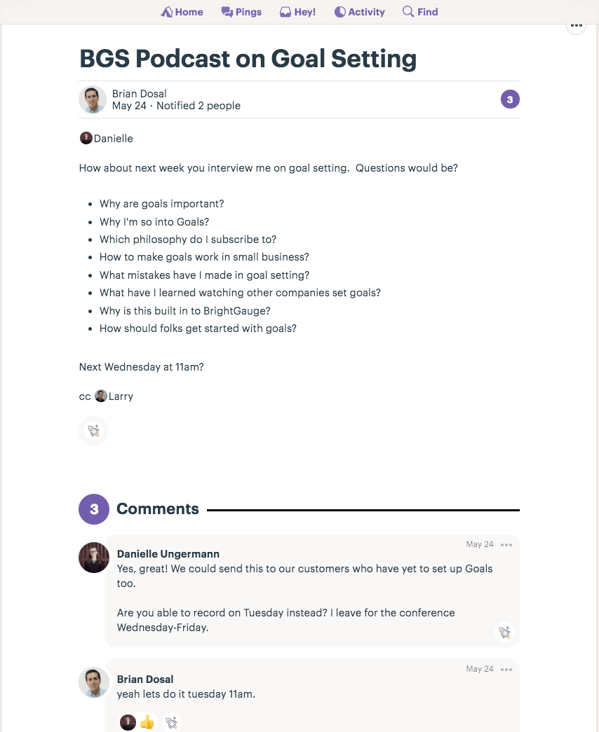How the Quality of Our Work Increased When Meetings Decreased

If you know us at all, you know we love talking about how much inspiration we draw from companies and people we admire. There’s so much to learn from industry leaders who have “been there, done that” so to speak, and there’s no shame in recognizing that we’ll always have room to grow.
At BrightGauge, we’re huge fans of Jason Fried and DHH and what they’ve done with their super successful company, Basecamp. They seem to have found a sweet spot when it comes to balancing work and life. Basecamp employees are hard-working and productive, but still find time to explore the hobbies and passions that make them happy. We love that. So not only do we actually use their product on a daily basis, but we’ve also tried to adopt some of the work habits that make their culture so unique.
One such habit - a big one for us - is trying to eliminate unnecessary distractions.
We’re Focused on Staying Focused
How many times have you left a meeting and thought everything could have been accomplished with a simple email? Or worse, the meeting time ran out so you set up another meeting to keep the conversation going (what I like to call ‘a meeting about a meeting’). This is an incredibly frustrating aspect of working at many companies.
So, when the good folks at Basecamp started writing about the idea of eliminating recurring meetings and status meetings, it struck a chord with us. It was something we had already been thinking about, so reading about how others were doing it inspired us. You know, that whole ‘be the change’ thing.
And we did it! We said goodbye to meetings. No more weekly status meetings. No more formally putting time on someone’s calendar in order to get questions answered. No more spending half your workday stuck in meetings and away from your actual work.
If a meeting is absolutely necessary, we’re encouraged to limit it to 15 minutes when possible, or even to meet over lunch. There are, obviously, exceptions and special circumstances but we try our best to practice what we preach.
Once we started working this way, a funny thing happened.
Less Meetings, Way More Productivity

When we got our work hours back, everything started to change. Suddenly, if one of our developers was deep into writing a complicated piece of code, he wouldn’t be forced to interrupt his train of thought just to attend a meeting that likely didn’t carry any urgency with it. Instead, he could continue to be laser-focused on his project without pressure to be anywhere else, meaning he’d probably have an uber-productive day.
Productivity lends itself to higher-quality work. It’s not just a coincidence.
Less Meetings, Less Anxiety
I started to realize something recently. This corporate culture of having lots of meetings on our calendars is causing us to operate in an anxious state.
In previous jobs, I remember opening my calendar at the start of the day, seeing the hours upon hours that were blocked for meetings, and thinking “when the heck am I going to tackle my to-do list?”. Sometimes, I even had meetings that overlapped with other meetings. We’re somehow expected to be in multiple places at once while consistently producing good and on-time work.
Some days, I’d get home from work and be totally drained and exhausted. Not to mention, I’d be at work late, since my to-do list wasn’t checking itself off just because I was in a meeting.
Having a wide-open calendar with plenty of freedom to actually complete to-do list items does wonders for the mind and soul. It allows you to go about your day with a sense of calmness, instead of feeling the buzz of high-anxiety coursing through your veins. You can actually take a deep breath and focus. You can actually smile at your co-workers instead of rushing past them yelling, “I’m late for my 3:00!”. You can actually get to work.
What a concept.
Quality Matters, A Lot
When did we get into this habit of trying to do everything? Why do we treat it like its an accomplishment when someone says they worked 90 hours in a week and barely got any sleep? Why are we sacrificing our health and our free time just to say we did more, more, more?
You know what people are actually going to notice? When a job is well-done. When you can tell that time and care were put into it. And when the product or service you’re working so hard on actually truly helps the end user.
Cal Newport, author of Deep Work (a BrightGauge favorite), said, “If you don’t produce, you won’t thrive - no matter how skilled or talented you are.” It’s true. We need to be afforded the space and time to create. We’re living in the age of information where quality is king. There’s no shortage of information out there (i.e. quantity) but not all of it is worth our time (i.e. quality).
Meetings, social media, a 24-hour news cycle, pool tables - they’re all distractions, and distractions hurt our focus much more than we think.
Phasing out meetings is about more than just taking away a tedious task we all roll our eyes at. It’s about retraining our brains to remain focused and to be better.
So, How Do We Communicate Internally?
It’s a good question.
Let us be clear. Doing away with meetings is no excuse for working in silos. We still very much stress the importance of good communication and visibility. Now, instead of talking about something out loud in a meeting, where people are most likely not even taking notes, we just write it all down.

We use Basecamp to keep things orderly and organized. Something that could have been said in a weekly status meeting is instead written in a Basecamp post and shared with relevant co-workers. Anyone who has a question can pose it in the same thread and all pertaining notes and comments will live in that thread forever. It’s awesome, really. It’s so easy to go back and reference, plus it saves a ton of time that would have been wasted asking people to rehash what was said in a meeting or digging through lots of different emails to try to piece the puzzle together.
The mental clarity you get from knowing you have 8 solid hours a day (give or take) to get your work done is insanely valuable. Add in the fact that Basecamp has your back and it’s no wonder that the quality of work will noticeably go way up.
Make Small Changes at First
It can be pretty jarring to jump to a meeting-free culture, so we took Fried’s advice on this one. He recommends getting rid of one meeting a month, then one a week, and so on.
This has made a huge difference in our rate of productivity and the quality of work we’re putting out - whether that’s in blog posts, new product features, support team responses, or even our sales calls. Try it out and see how it works for you. We’d love to hear about it.
Want even more productivity tips? Check out our free webinar, ‘Managing Productivity of a Service Team’, to learn how one of our customers leads his Service Team operations.
Free MSA Template
Whether you’re planning your first managed services agreement, or you’re ready to overhaul your existing version, we've got you covered!



